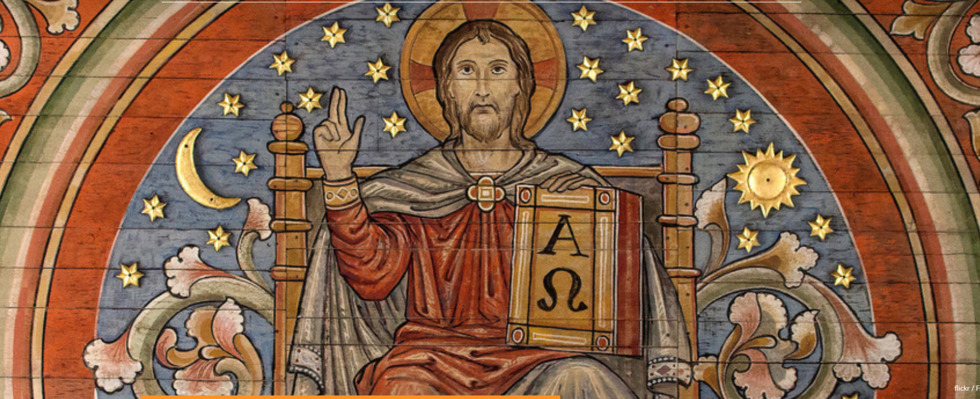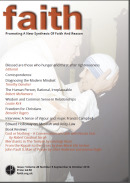Correspondence
FROM PROFESSOR KEITH WARD
Dear Madam Editor,
Thank you for the very kind review of my book; I appreciate that.
I was a little surprised that Fr MacKenzie thinks that I divide reality into the (physically) value-less and the (spiritual) valued. I did not mean to convey that impression, but I have clearly done so! My actual view, as an Idealist, is that material or physical things are the expressions of spiritual reality, so I do not want to make an absolute gap between the two. I do think that cognising and valuing are intertwined, but I suppose they are abstractly distinguishable.
In short, I think our views are closer than Fr MacKenzie suggests. But I have obviously stated some things in a confused way, and I will think about that for the future. Thank you so much for the helpful comments.
Yours faithfully
Prof. Keith Ward
Regius Professor Emeritus of Divinity, Oxford
Research Fellow Heythrop College, University of London
FROM REV HIUGH MACKENZIE
Dear Madam Editor,
I thank Professor Ward for his generous response. It is with respect, therefore, that I take the opportunity afforded by Professor Ward’s correspondence to express my thoughts a little more at length. I stand corrected that we do share more concerning how to rebuild natural philosophy than I had acknowledged. We both accept, I think, these four related things about human knowing: (1) sentient experience of "physical things" is intrinsically infused with objective meaning, purposefulness and value; (2) flowing out, of this and intertwined with it is, at least for humans, "cognition" of the physical, and moral experience of such value; (3) this moral experience and engagement reveals the spiritual realm as something foundational to and "abstractly distinguishable" from the physical realm – values for Ward, mind for me; and (4) one piece of evidence for making such a distinction is the uniquely "publicly …. compelling" nature of cognisable physical things.
Where we still disagree, I think, is exactly how we characterise the spiritual–physical distinction. Ward tends to see the spiritual as fundamentally the realm of objective value, whereas I see it as the realm of knowing and willing mind. For Ward, to be spiritual is to be sentient and moral. The physical "expresses" the value-laden spiritual in a value-free, and hence sensible, "objective" and publicly compelling, manner. For me, to be spiritual is the power to discern, choose and create value. The spiritual is mind. Value and purpose are intrinsic to the physical, as known and willed by mind.
Below I would take the opportunity to ground my point at more length, with Edward Holloway’s help.
Modern reflection upon Ward’s key concept of "the value of an object" can be split into "intrinsic" and "instrumental" accounts. Ward errs on the intrinsic side. He sees values as quasi-objective realities. By contrast, the instrumental account sees them as arising from perception of the usefulness of objects. The Pragmatist version of this tends to see no other intelligibility in such objects than their practical potentialities for us, famously collapsing the "fact–value" distinction. In this increasingly influential school of thought the various "factual" descriptions of an object, rather than describing its nature, simply redescribe its utility.
Holloway unifies these two emphases. This flows from his identifying as one the Kantian noumenon-phenomenon duality (see his Perspectives in Philosophy Volume III: Noumenon and Phenomenon: Rethinking the Greeks in the Age of Modern Science).
The phenomena we perceive concern individual things in their universal, environmental, constructive relationships. But such objects are also necessarily in an intelligibly impactful relationship with our perceiving minds. And this intelligibility enables us to interact with our environment creatively. On this basis Holloway argues that we can discern that the universe of such objects forms a unity and that these objects are in practical relationship with an ultimate, creative mind. This all means that the universe is noumenal. Something’s ultimate being is known and willed by absolute Mind.
This involves affirming the Pragmatist position that the experience and reality of the practical value and purposefulness of objects is fundamental to their intelligibility. This meaningfulness to the observer is at the root of all descriptions of an object, including adjectives such as objective, publicly compelling, predictable, etc. Physical facts, under their various relational descriptions (e.g. "caused"), always refer to their practical value. This is because they capture aspects of being known and engaged with by a human, and ultimately known and loved by God for his purposes. To be intelligible is to have a relevance to, a value for, the knower’s further choices and actions.
So there simply is not an absolutely "unemotional registering of a house" (Ward, p.109) – in the basic sense of emotional as an experience of "relative good for me".
The objects of sensation have a valuable instrumentality for the perceiver that captures what they are, their natures. This means their value is intrinsic to their being as individuals in a hierarchical, environmental network. Their value is not a quasi-Platonic form, as it seems in Ward’s idealism. Affirming a Platonic formal value does certainly undermine reductionist materialism, but it is not itself evidence of a realm in which exists the transcendent Creator.
So the only ontological transcendence of the physical is that of spiritual, creative, intentional mind. This realm, in our experience, is intrinsically complementary to objects of sensation, which are easily manipulable, predictable and publicly compelling – but they are far from "value-neutral". It is in this realm of self-conscious recognition, not in the realm of value, that I place the absolute Creator.
Yours faithfully
Fr Hugh MacKenzie






